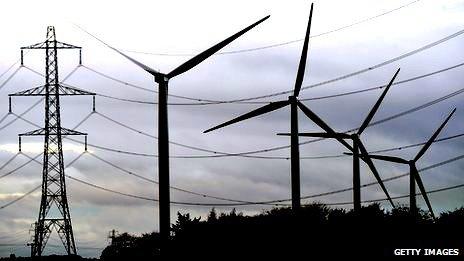Local communities offered more say over wind farms
- Published
- comments

Local communities are to be given more powers to block onshore wind farms, but also offered greater incentives to accept them, the government says.
Planning guidance in England will be changed to ensure local opposition can override national energy targets.
But the measures will see a five-fold rise in the benefits paid by developers to communities hosting wind farms.
The subsidies - worth about £100,000 a year from a medium-sized farm - could be used to reduce energy bills.
Alternatively, the money could pay for energy efficiencies in the host community or fund other local initiatives.
The government said the measures would ensure local communities had a greater stake in the planning process.
It said it expected the energy industry to improve its community benefit packages by the end of the year.
Protection of landscape
This increase will be from £1,000 per megawatt (MW) of installed capacity per year, to £5,000 per MW per year, for the lifetime of the wind farm.
This means a medium-sized 20 MW wind farm could produce a benefits package to the local community worth £100,000 a year.
Energy Minister Michael Fallon says he wants to "give local communities more control"
It will be up to local communities and developers to decide how any money is spent.
For example, a similar scheme run by the wind farm company RES at its Meikle Carewe operation, near Aberdeen, will see local residents get £122 off their annual electricity bills.
Energy Secretary Edward Davey said: "It is important that onshore wind is developed in a way that is truly sustainable - economically, environmentally and socially - and today's announcement will ensure that communities see the windfall from hosting developments near to them, not just the wind farm".
The Department for Communities and Local Government will make sure local people have more say in the planning of wind farms and that the need for renewable energy does not automatically override the planning concerns of communities.
"We want to give local communities a greater say on planning, to give greater weight to the protection of landscape, heritage and local amenity," said Communities and Local Government Secretary Eric Pickles.
Planning approvals for wind farms in England have dropped in recent years, a situation the government is keen to turn around.
In 2008, about 70% of applications were approved, but approvals were down to 35% in 2012.
More than 4,000 turbines are in operation across the country, with almost 6,000 under or awaiting construction or in the planning system.
In 2011, onshore wind farms generated 3% of the UK's electricity supply, generating enough power for the equivalent of 2.5 million homes.
BBC deputy political editor James Landale says the coalition government wants to generate more renewable energy, but wanted to shift the balance of decision-making more in favour of local communities.
'Coalition tensions'
A Conservative source said the prime minister felt it was important to take local people into account so that if they did not want wind farms they could stop them.
But Lib Dem sources emphasised other changes, namely the increased subsidy from developers - a greater incentive for residents but also a greater cost for developers, our correspondent says.
He adds that the bottom line is that these changes will almost certainly mean fewer onshore wind farms and they will add to coalition tensions.
Maria McCaffery, chief executive of trade association RenewableUK, said the proposals would signal the end of many planned developments and that was "disappointing".
She said: "Developing wind farms requires a significant amount of investment to be made upfront. Adding to this cost, by following the government's advice that we should pay substantially more into community funds for future projects, will unfortunately make some planned wind energy developments uneconomic in England.
"That said, we recognise the need to ensure good practice across the industry and will continue to work with government and local authorities to benefit communities right across the country which are hosting our clean energy future."
Paul Miner, of the Campaign to Protect Rural England, welcomed the measures.
"We want to see a fairer and more open planning process, more discussions before planning applications are submitted... but we also want to see wind farm developers spend far more money on community investment than they are in England at present," he said.
"They're only spending typically half the amount in England that they spend in Scotland."
Meanwhile, Roberta Blackman-Woods MP, Labour's Shadow Planning Minister, said the government's plans lacked detail.
"The Government has announced these changes without any clarity on the size of wind applications to be included, the extent of powers that communities will have to stop unpopular applications and even if communities without a local plan will benefit," she said.
- Published7 March 2013
- Published27 February 2013
- Published24 January 2013
- Published15 August 2011